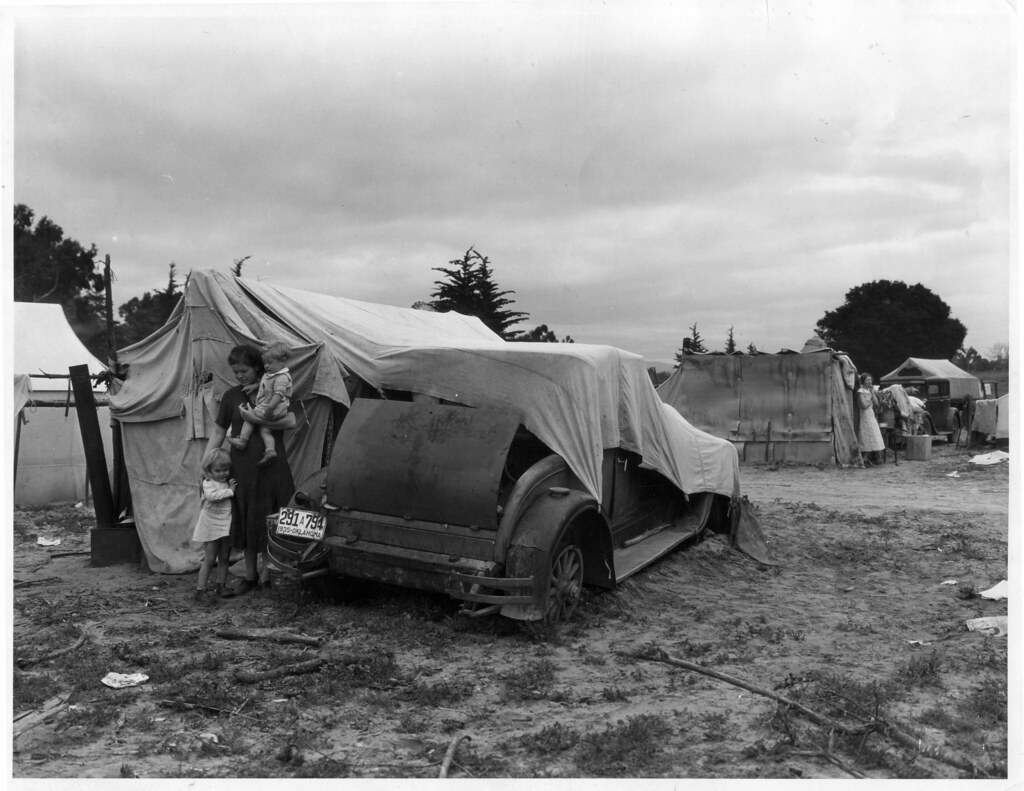.

A migrant family looking for work in the pea fields of California: photo by Dorothea Lange for Federal Resettlement Administration, 1935 (Franklin D. Roosevelt Presidential Library)
In the makeshift tent encampment at two o'clock in the morning: sounds of a bothered dog barking, a man continually coughing from deep within the obscuring arc of random shadows, someone halfheartedly strumming a guitar into the reddish streetlamp distance.
Looming beyond, a large grey structure, mute concrete hulk of a daytime civic establishment whose spirit departed from its body so long ago no one knows any more whether anything living was ever really in there behind the façade.
The temperature drops.
Still those who linger in wait for nothing remain vigilant.
Though there are no children here.
Tent flaps stippled by the sharp night wind off the water, the night a strange palimpsest of drifting spectral presences.
White and black ghosts all gone white against the muffling dark backdrop, futureless and featureless as the spots on dominoes.
Someone rolls past on a skateboard, setting off a frenzy of agitated barking.
One thing's for sure, reflects the young crazy-haired homeless man from Minnesota after a long philosophical moment. That dog does NOT like skateboards.
Looming beyond, a large grey structure, mute concrete hulk of a daytime civic establishment whose spirit departed from its body so long ago no one knows any more whether anything living was ever really in there behind the façade.
The temperature drops.
Still those who linger in wait for nothing remain vigilant.
Though there are no children here.
Tent flaps stippled by the sharp night wind off the water, the night a strange palimpsest of drifting spectral presences.
White and black ghosts all gone white against the muffling dark backdrop, futureless and featureless as the spots on dominoes.
Someone rolls past on a skateboard, setting off a frenzy of agitated barking.
One thing's for sure, reflects the young crazy-haired homeless man from Minnesota after a long philosophical moment. That dog does NOT like skateboards.

A squatter camp in California: photo by Dorothea Lange for Federal Resettlement Administration, 1935 (Franklin D. Roosevelt Presidential Library)



2 comments:
I spent an unhealthy amount of last night watching online the city council meeting discussing the proposed legalization of the encampment in its front yard. I was struck by the notion that not only would such a proposal quite likely be bad public policy (I've no reason to think city leaders are lying about the ill economic implications of a green-light sanction), but also bad for the encampment itself (inasmuch as the camp is, or so I was under the impression, a symbolic presence of dissent and/or disobedience). I don't know what to do or quite make of this ideological coincidence, but perhaps the Occupant's slogan'd solidarity with Bartelby's "I would prefer not to" is more significant than its occasional appearance on a sign. The Tombs await us all anyway, so we needn't fear the ending.
Brad,
Yes, the classic instance of noncompliance.
Bartleby, the Scrivener: A Story of Wall Street.
Herman Melville, 1853, published 1856
"Now and then, in the haste of business, it had been my habit to assist in comparing some brief document myself, calling Turkey or Nippers for this purpose. One object I had in placing Bartleby so handy to me behind the screen, was to avail myself of his services on such trivial occasions. It was on the third day, I think, of his being with me, and before any necessity had arisen for having his own writing examined, that, being much hurried to complete a small affair I had in hand, I abruptly called to Bartleby. In my haste and natural expectancy of instant compliance, I sat with my head bent over the original on my desk, and my right hand sideways, and somewhat nervously extended with the copy, so that immediately upon emerging from his retreat, Bartleby might snatch it and proceed to business without the least delay.
"In this very attitude did I sit when I called to him, rapidly stating what it was I wanted him to do—namely, to examine a small paper with me. Imagine my surprise, nay, my consternation, when without moving from his privacy, Bartleby in a singularly mild, firm voice, replied, “I would prefer not to.”
"I sat awhile in perfect silence, rallying my stunned faculties. Immediately it occurred to me that my ears had deceived me, or Bartleby had entirely misunderstood my meaning. I repeated my request in the clearest tone I could assume. But in quite as clear a one came the previous reply, 'I would prefer not to.'
'Prefer not to,' echoed I, rising in high excitement, and crossing the room with a stride. 'What do you mean? Are you moon-struck? I want you to help me compare this sheet here—take it,' and I thrust it towards him.
'I would prefer not to,' said he.
Post a Comment